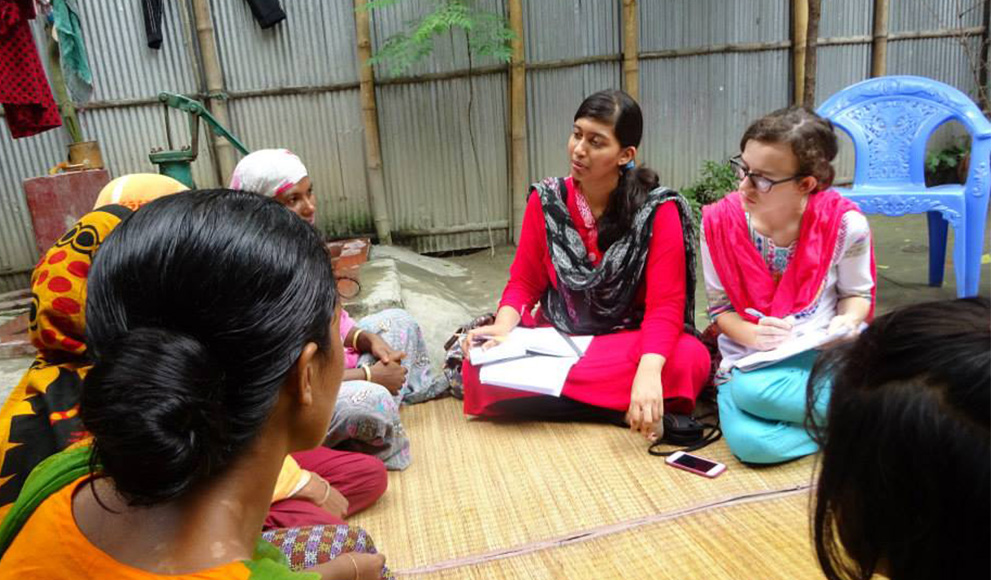Two Wellesley Students Win Awards for Work on Hunger-Related Issues

The Borlaug Dialogue is an international symposium that brings together leading scientists and global leaders to discuss agricultural and food security issues. Wellesley was well represented at the 2015 gathering in Des Moines late last year. Ali Saueressig '19 and Sophie Olson '18, who completed eight-week summer internships in Bangladesh and China, respectively, through the Borlaug-Ruan International Internship program, attended the symposium and were recognized for their excellent research as interns.
The symposium is named for Norman Borlaug, who won the Nobel Peace Prize in 1970 for developing improved wheat varieties that reduced hunger in India and Pakistan. Featured speakers at the October event included Sir Fazle Hasan Abed, 2015 World Food Prize Laureate; Florence Chenoweth, Liberia's minister of agriculture; U.S. Secretary of Agriculture Thomas J. Vilsack; Howard G. Buffett, chair of the board, The Howard G. Buffett Foundation; Sheryl WuDunn, Pulitzer Prize-winner and banker; and Chelsea Clinton, vice chair of the Clinton Foundation.
"There's something really special about being able to learn from all of these people who have dedicated their lives to issues surrounding food security and poverty," said Saueressig, who plans to major in environmental studies. "It's also incredible because all of these people want to talk to and learn from you."
Saueressig, who won the John Chrystal Award, wrote a paper on the impact of agricultural credit on the social and economic empowerment of tenant farmers in Bangladesh, based on her research. During her 2014 internship, the summer before her senior year of high school, she worked with BRAC, an international development organization based in Bangladesh, and visited three villages, examining tenant-farmer development and whether men or women benefitted more from a credit program offering loans for agricultural use such as the purchase of seeds, livestock, or land.
"My time in Bangladesh showed me just how complex issues of food security, poverty, and development are. There is no one way to attack an issue. You can’t fight food insecurity without also targeting poverty, and you can't target poverty without education, but you can’t have effective education if kids are starving, and so on," she said. "Any approach will have to be comprehensive."
Olson, an anthropology major, was awarded the Elaine Szymoniak Award. She wrote about hybrid rice and the possibilities of chloroplast transformation based on her internship at the China National Hybrid Rice Research and Development Center in Changsha, China.
"Even though most of the people at the conference were scientists, I think it's important that I am choosing to major in anthropology, since there is no one discipline that can figure out a solution to ending hunger," she said. "We need perspectives from people who know the technology and the science, as well as people that know the culture in order to create a truly long-lasting and permanent solution."
Robert L. Paarlberg, Betty Freyhof Johnson '44 Professor Emeritus of Political Science, also attended the symposium. "As someone who once worked with Borlaug, and who has spoken several times at the Borlaug Dialogue, I was filled with great pride to see two Wellesley students honored there," he said. He added that some people in attendance may have been surprised to see students from a liberal arts college working in technical fields like agricultural science and rural development. He said, "That only proves how little they knew about Wellesley."
Wellesley's emphasis on critical thinking and the ability to see an issue from all sides is paramount for Olson, who grew up on a farm in La Crosse, Wisconsin, and started volunteering at a soup kitchen when she was in high school. She was often surprised by the people she served. "Some of them came from stable jobs and lived in good houses. You wouldn’t know from the outside that they were struggling," she said. "That experience brought hunger to the forefront of my consciousness."
"The interdisciplinary approach Sophie and Ali bring to these problems highlights the best of a liberal arts education, and it reminds us why that approach is so important to effecting much-needed change around the world," said Jay Turner, associate professor of environmental studies. "Their research reflects the deep concern for sustainability shared by many students and faculty at Wellesley. It is exciting to see their research catapult them into conservations with leaders in the field of agriculture and sustainable development."
For Saueressig, some of the most inspiring conversations at the symposium happened with Chelsea Clinton, who spoke about encouraging girls in the United States and developing countries to pursue math, science, and technology educations as a way to escape poverty, and with Sheryl WuDunn, the first Asian-American reporter to win a Pulitzer Prize. "Both championed the power young women have to make a change," Saueressig said.
